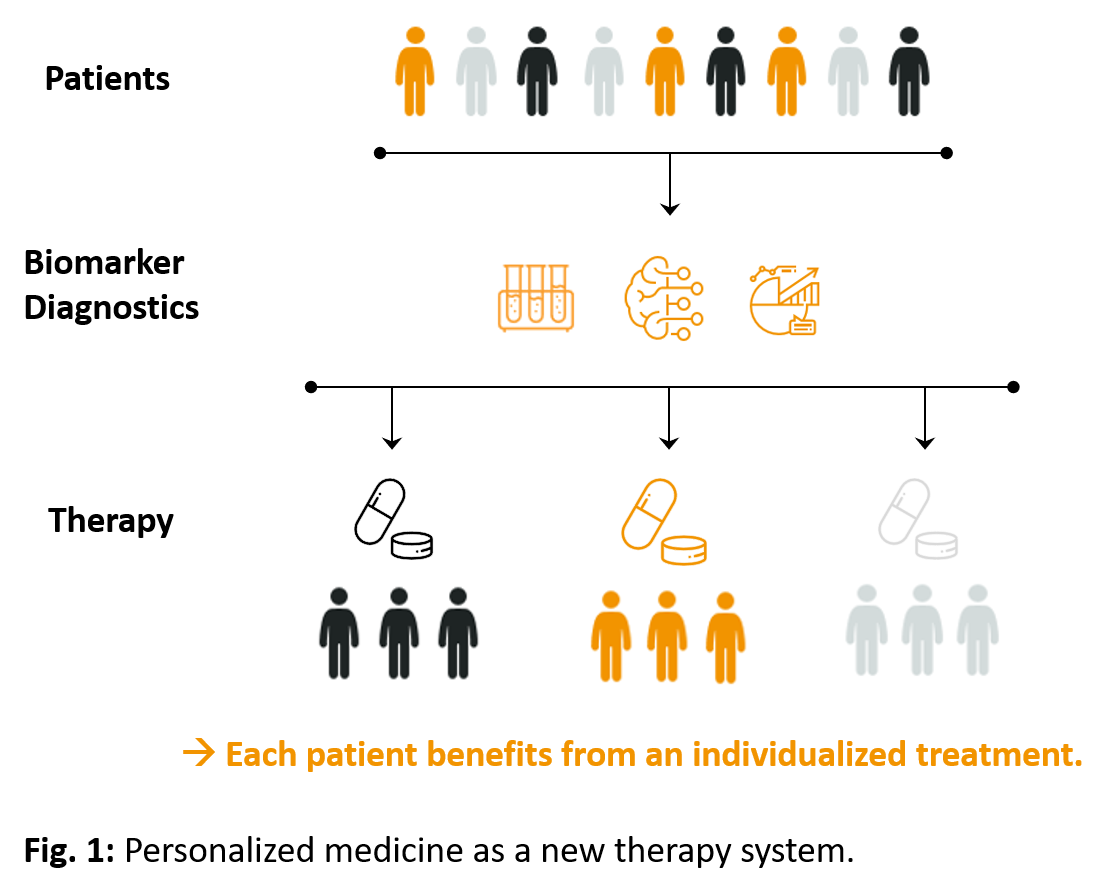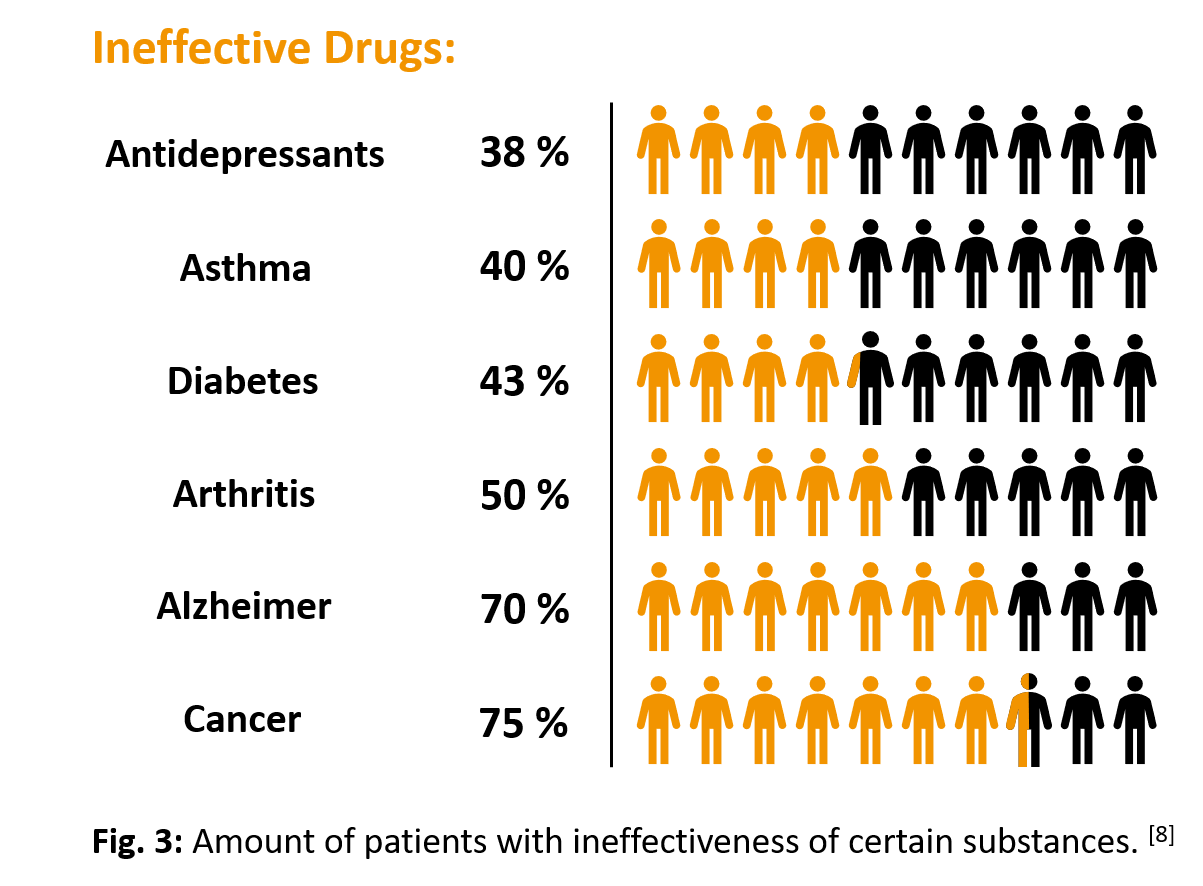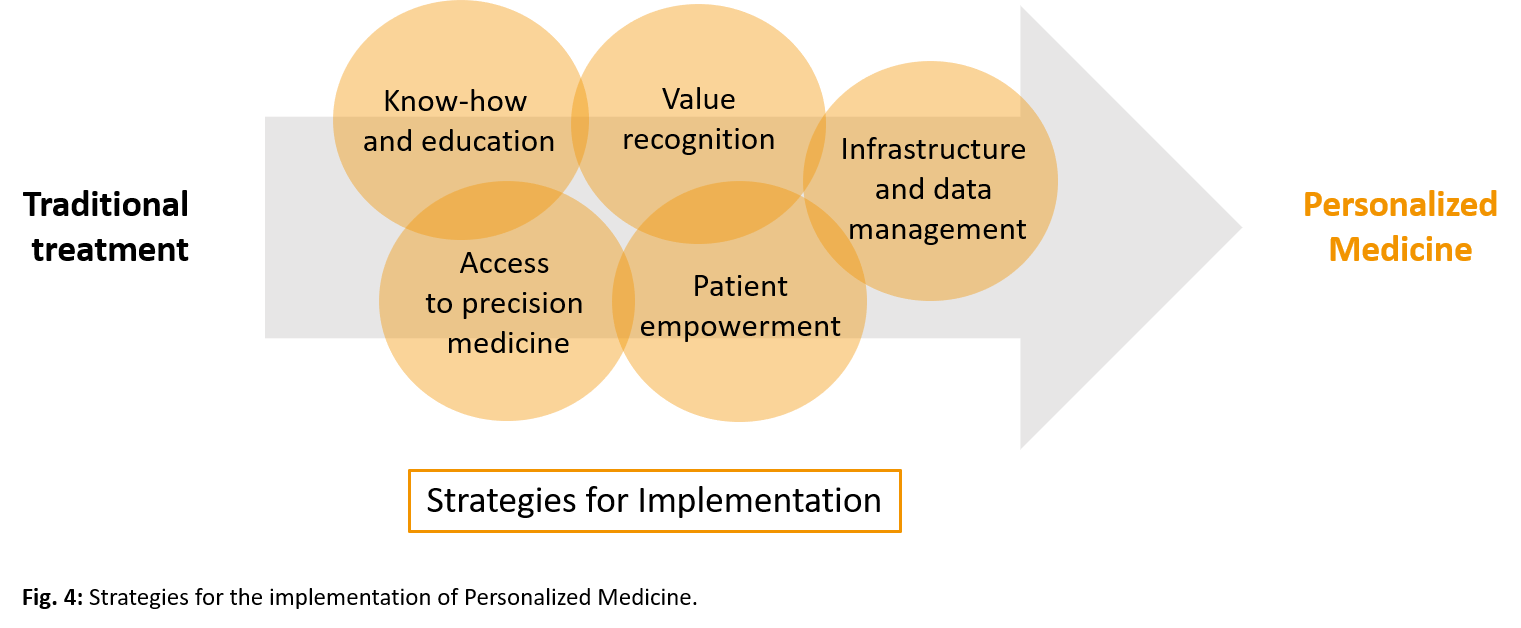Principles
The official journal of the European Union referring to Personalized Medicine for Patients (2015/C 421/03) says:
”[…] that there is no generally accepted definition of the term `Personalized Medicine`. In general Personalized Medicine describes a concept, which defines the optimal treatment option for the patient to the right time on the basis of the characterization of pheno- and genotype of individuals (e.g. molecular profiling, medical imaging, information on the manner of life) and/or determines the predisposition for a certain disease and/or enables prevention early and direct.“ [1]

So Personalized Medicine means a fixed combination of a foregoing molecular test showing the reaction of the patient‘s body to certain therapies (companion diagnostics) and a treatment based on these results. [2,3,4,5]. The molecular test shows which treatment is most promising for the patient (Fig. 1).
Thus, Personalized Medicine enables the selection of therapies that are exactly adapted to the genetic conditions of the patient individually. Wrong or ineffective treatments, as well as negative side effects, can be prevented, and a targeted and promising treatment can be conducted, ensuring safety for the patient and a successful therapy. [6,7,8]
Personalized Oncology
Studies on Personalized Medicine are mostly conducted in the area of Oncology (Fig. 2), where the need of individual therapies is extremely high. Cancer as a very severe disease is a strong physical and psychic burden for the patient and is often diagnosed very late. [3] Furthermore, cancer development results from genetic alterations, making Oncology the perfect field for applied Personalized Medicine. [5,9] The highly different biochemical and genetic conditions of each tumor create a range of tumor types, which complicates the therapy and makes many standard treatment options nearly ineffective, especially in rare and highly aggressive cancer types (Fig. 3). [5,8]


Currently, researchers focus on the development of inter-entity substances. These drugs do not target the organ, where the tumor develops, but the genomic alteration causing the development of the tumor. Inter-entity substances can attack every type of cancer which shows the specific molecular genetic variation, the so-called biomarker. [5] A good example is Merck‘s new wonder weapon KEYTRUDA® containing the substance Pembrolizumab, which already got an approval for the treatment of 11 different cancer types. [3,10] Currently there are studies for several hundred more types of cancer and combination therapies with this substance. [10]
International standards through knowledge transfer
Personalized medicine, a cross-sectoral field of application, requires expertise and data material of many different fields and branches like IT, Pharma and Economics. [2,6,7] International collaboration and arrangements will create the basis for new techniques and standards to successfully implement precision medicine applications. Therefore, the German Ministry participates in the European project „Personalized Medicine 2020 and Beyond“, uniting 27 partners from 14 countries. The members of this initiative make recommendations on the efficient usage of personalized treatments for the areas of health research and medical care and for providers. [11]
Not only Germany, but also other countries aim to improve the individual health. Specialists of diverse branches and high-ranking representatives practice extensive knowledge exchange on conferences regarding Precision Medicine all over the world. The participants are dealing with the latest studies on state-of-the-art diagnostics, modern treatment methods and molecular biomarkers as well as cost-benefit-strategies and ethics. [12]
Examples of eminent periodic conferences regarding Personalized Medicine:
- International Congress on Precision Medicine Beyond Cancer (PMBC) [13]
- International Consortium for Personalized Medicine (ICPerMed) [14]
- Nordic Precision Medicine Forum [15]
- Personalized and Precision Medicine International Conference (PEMED) [12]
Future aspects
Precision medicine will become more and more important for the healthcare sector. Patients and physicians benefit from a facilitated therapy selection, and authorities and payers profit from a more precise cost-benefit-calculation and a more efficient usage of resources. But the integration of Personalized Medicine techniques into standard care still lacks. [4,17] Despite great technological progress and many established personalized treatment options, there are still several hurdles the healthcare sector has to face.
Currently there are several strategies for a faster integration of Personalized Medicine into standard care (Fig. 4): [3,4,8,16,17]
- Better awareness and a deeper understanding of personalized treatments in public and the healthcare sector
- Empowerment of the patient to decide on the usage of his private data and to include his personal decision into therapy selection
- Recognition of the added value of Personalized Medicine for the healthcare sector
- Improvement of the infrastructure and data management processes
- Ensuring and enhancement of the access to precision medicine services

To strengthen the current market position of Personalized Medicine, stakeholders and authorities should better invest in already established concepts of precision medicine instead of wasting the shrinking financial resources for the research on new treatment methods. Because a technically better version of a single element cannot be a solution for the existing problem. Advanced health care requires a close cooperation of issue-related fields, exchange of interdisciplinary knowledge and innovative technology. Short- and long-term strategies, a more efficient usage of monetary and technological resources and the improvement of international knowledge standards will enable the integration of Personalized Medicine into standard care.
Contact person:




